Review: Testament: The Order of High Human
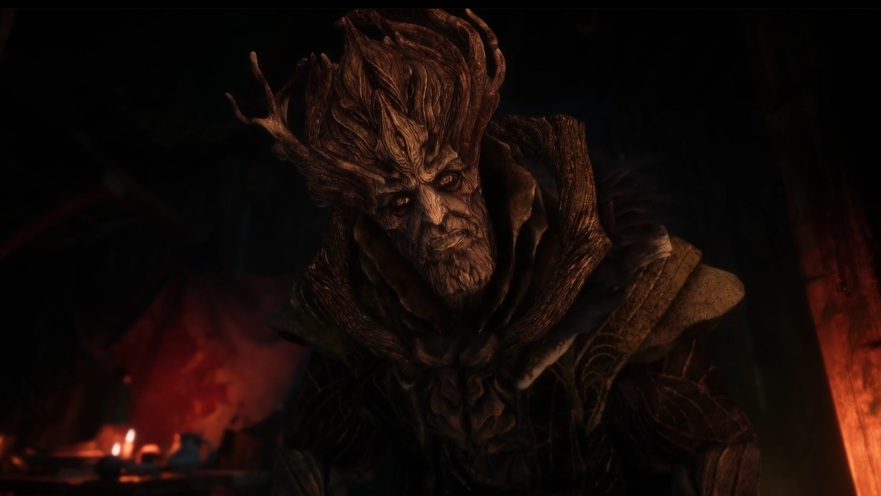
Sometimes, a review opportunity presents itself that, despite my not having previously heard of the game, IP, or developer, makes me curious about it by its genre and description alone. After all, while I have reviewed titles from almost every genre over the years, I of course do have favorites.
Today’s game, Testament, is one such case. It bills itself as a “first-person metroidvania,” and I immediately think to myself, “Wait, I love metroidvanias. Is this aiming to do in a fantasy setting what Metroid Prime did in a sci-fi setting?” and was intrigued. Also, Metroid Prime 4, which I still have on preorder, still isn’t out after 7 years…
Developed and published by Faryship Games, Testament: The Order of High Human was released on July 13, 2023 for PC via Steam. Off we go!
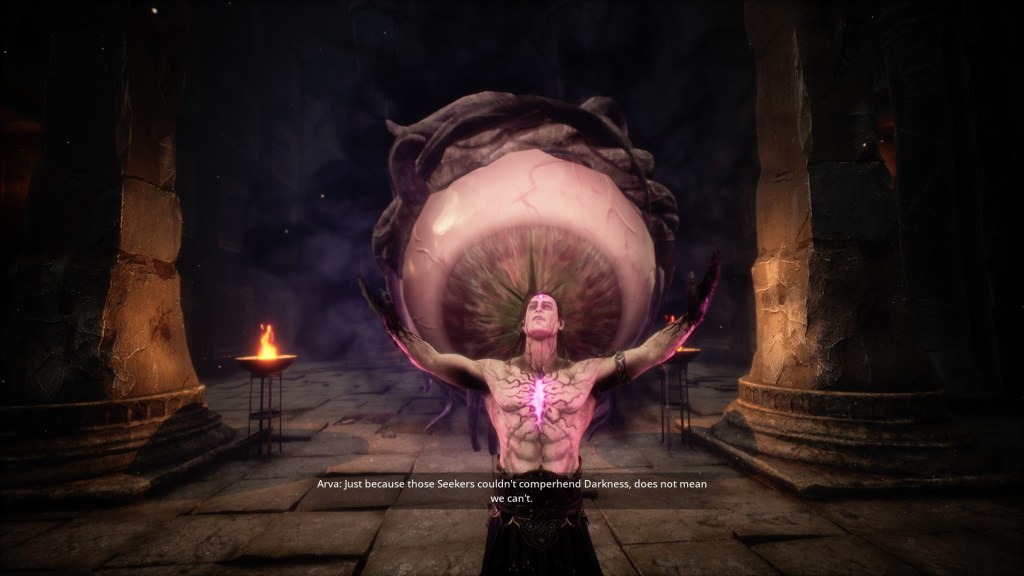
A Story About… Something
One of the key points to hit in most game reviews is the story, if there is one. Throughout my time playing Testament, I found myself asking if there was one. The game starts off with barely any introduction. I didn’t even find out the hero’s name (Aran) until he spoke and I saw it in the subtitles. I still don’t quite understand what this game is really about, other than Aran appears to be a king of a realm, and has returned after some apocalypse of some sort that is never really explained outside of the game’s store page on Steam.
Every now and then you’ll suddenly and jarringly enter an in-world cutscene where some demon-looking thing who is apparently Aran’s brother appears to antagonize him. Despite seeming to be some sort of powerful being, he simply appears via a portal, says some stuff to upset the hero, and then disappears from whence he came, without us learning anything. Between these events, Aran will periodically talk down about all the races/creatures in the environment and how they got corrupted or lost their way.
But all of this lore I’m given is completely disconnected. There’s very little actual on-going story, and Aran talking to the player ends up being more annoying than helpful as a result, especially with his poorly-written lines.
Contrast this with the game series it seems to be trying to emulate: the Metroid Prime series. “The” first-person metroidvania. Samus is an almost silent protagonist (only having voiced lines in the black sheep of the series, Other M), and while story isn’t a huge focus in most of the series, the plots are there and are easy to understand. The Prime games have lore all over that you’re rewarded for discovering, and most importantly of all, your mission is very clear in every game in the series.
In Testament, the lore is thrown at me seemingly at random. After a few hours of puzzle dungeons, multiple boss fights, and various other encounters, I still had no idea what my ultimate goal was, except maybe kill this guy who keeps taunting me, but even that I’m not 100% sure about. You might say this is an unfair comparison to make, but what other games associating themselves with the genre are there to compare and contrast with? If we throw out the “first person” genre qualifier, even Castlevania: Symphony of the Night (an infinitely better game), with its slightly broken dialogue in a few spots, has a far easier to understand story and goal. And, obviously, Metroid and Castlevania together both defined and named the genre!
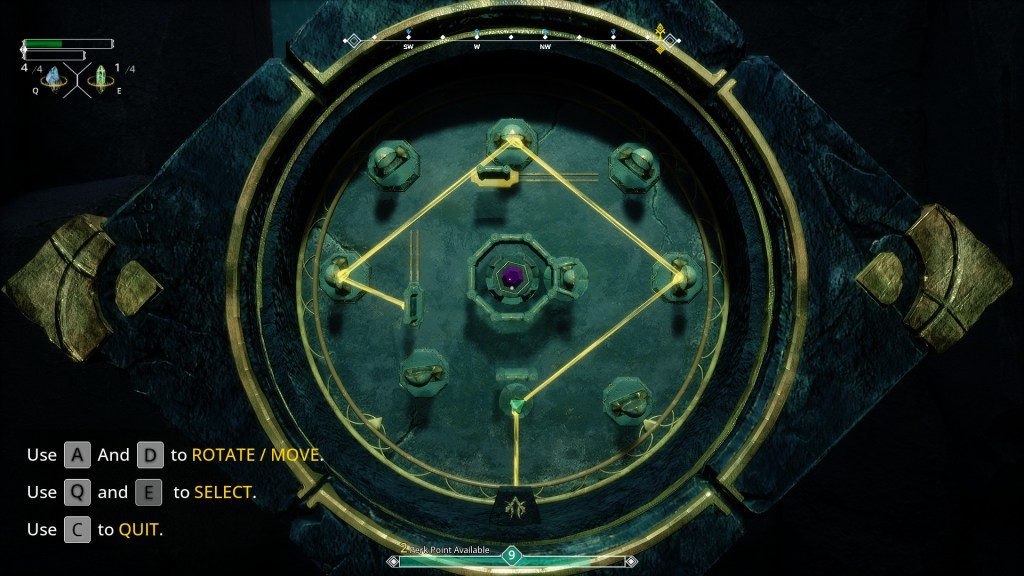
Halflings and Nature Beasts
Okay, so the story is pretty problematic. How about the gameplay? Well, there’s good news and bad news.
First, the good. The combat system is pretty decent. Aran wields a combination of swordplay, archery, and magic against his foes. Since the trope usually goes that armored guys with swords can’t use magic, that means Aran feels pretty powerful.
While nothing truly stands out as the pinnacle of gameplay perfection, your sword combos work and hit when it feels like they should, and dodging/evading is there and thus skill can kill your enemies faster and keep you from dying, which is a good thing. The magic, though not especially flashy or exciting, is useful and there are a variety of spells that all have their uses, so it’s a good addition to the gameplay. You also can find and make (with a generic resource dropped from enemies) a variety of consumable items that are all generally useful in some way.
At times, you will need to platform or solve puzzles to make progress, and there is some variety here. The puzzles are not anything especially brain bending, but are fun enough, even if the light-bending puzzles in particular seem oddly similar to the lockpicking in Hogwarts Legacy (of all things…).
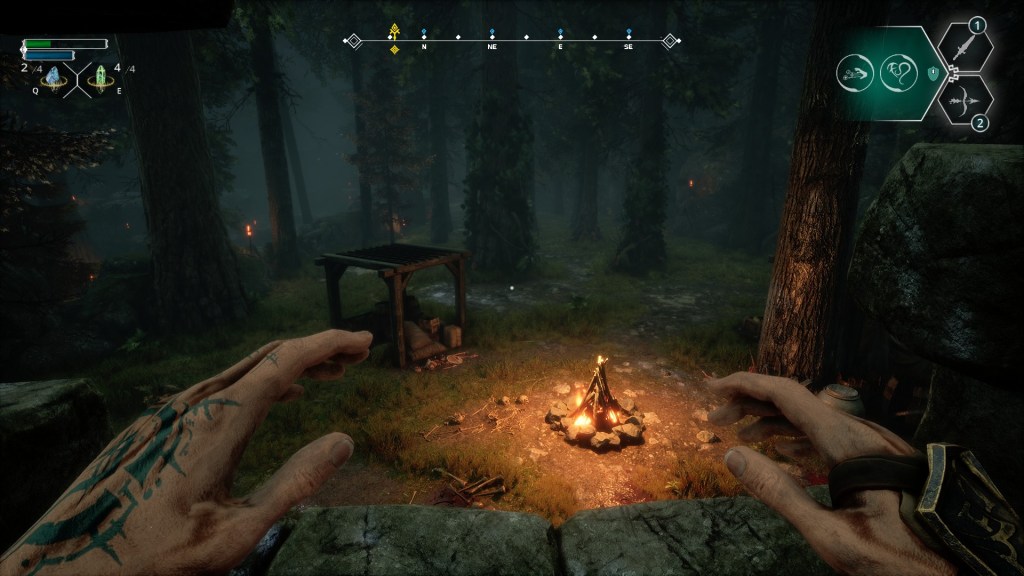
The bad news? Everywhere else, we’ve got problems. First of which: I hope you really like the swordplay, because ammo and magic recovery items are scarce to the point that you won’t want to use them unless really necessary, for fear of not having them when you need them. Meaning despite the game having a neat-looking skill tree, you’ll be wanting to take the sword skills whenever you can, because those are going to have the most impact. Those fire spells and archery buffs may look cool, but they’re too awesome to use. This is true in spite of the fact that the game’s store page insists that you can use your spells and items freely because you can craft more. But the general-purpose crafting resource is far from infinite in supply either.
Next: what’s one feature that the majority of games (not all, to be fair) we apply the term “metroidvania” to have? A map. Testament wants to call itself part of the genre, but it doesn’t have a map. You have no idea where you are at all in this game. Even when you’re selecting your destination at a teleporter, there is no visual representation of the world you’re in whatsoever. You’re just going to have to make your own map or remember what previous areas looked like and what you missed in them. There is a compass at the top of the screen, but since this isn’t really an open world (despite the fact it may look like one at times), the compass is basically useless. Never since the original NES Metroid have I ever felt so lost in a game.
But wait, there’s more! There are a multitude of other inconsistencies and annoyances marring the experience left and right. Early in the game, you arrive at the apparent entrance to a temple of some sort (with Aran stating the obvious). A cutscene is triggered, in which a hole opens up in the floor underneath you, causing you to fall into a deep cavern, leading to a puzzle dungeon of sorts (which is apparently the actual temple interior). Return to this area later after you find your second teleport location, and you’ll discover the hole you fell through is no longer there.
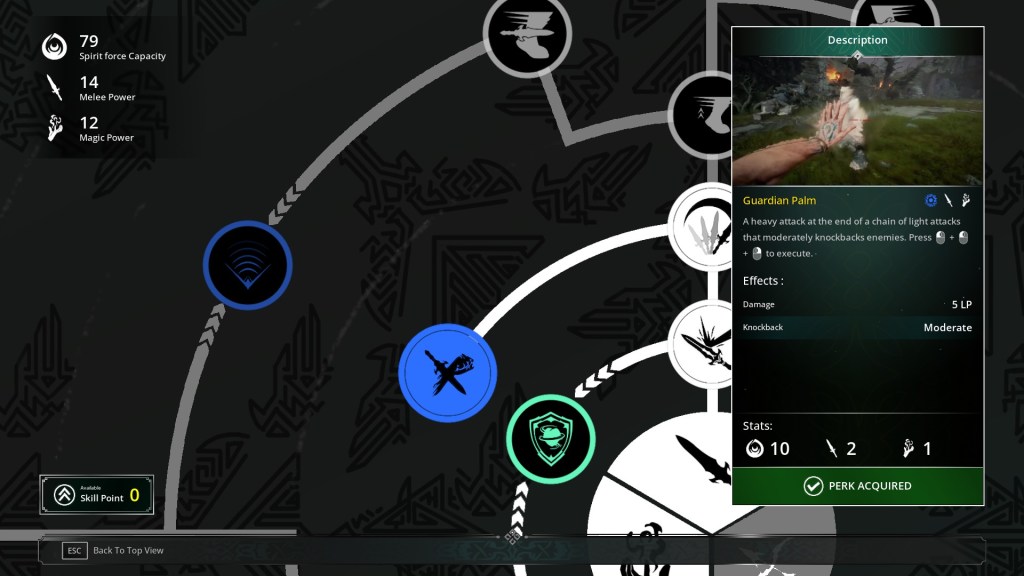
Sometimes, when you fall in pits or water, the game puts you back near where you fell, while other times, falling in the same kinds of water or pits will kill you, taking you back to your last checkpoint. And as an added bonus, these checkpoints are the only way to save the game. There are no save rooms or any other form of manual saving at all.
Oh, and invisible walls. Don’t you dare think of exploring; there are invisible walls EVERYWHERE. You can only climb on pillars, rocks, and crates if the game says you can and there is a clearly marked splash of white paint to indicate where you can climb or wall-run. Otherwise, it’s off limits. Sometimes, even where the walls of an area are clearly defined, there’s actually an invisible wall well before you actually walk up to that wall, which is completely unnecessary. And speaking of completely unnecessary, that describes the continue prompt on loading screens. You can pause the game any time by opening the menu, I really don’t need the game to wait for me to press enter on every level transition.
All over the game you’ll find small caves and passages that you can’t enter. Aran must stick to the straight and narrow path. Unlike in the Metroid Prime series, where many rooms will have multiple paths in and out, here these passages – which look like paths you can take – are only for the enemy. Most of the time, your path through the game is extremely linear, with only very occasional backtracking. And once again, before crying “Unfair!” at these comparisons to a pair of well-known AAA game franchises, remember that the game’s developers are claiming inspiration by them.
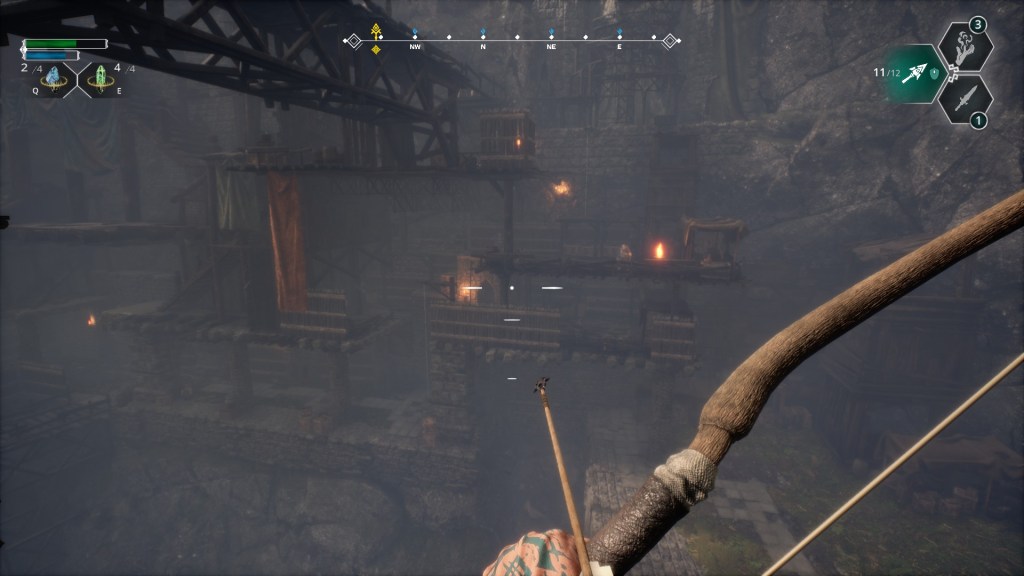
Cutting Through Mediocrity
Now, I admit we’ve been pretty negative here. You might get the impression, then, that what we have here is a game made by a group of people who didn’t really care or put their heart into it. But I don’t think that’s the case. For what it’s worth, as empty and claustrophobic as the areas actually are, the actual visual design of the levels is quite good. From the art to the lighting and effects, it’s hard to fault the game for its visuals, which are easily the game’s strongest point (at least, outside the over use of blur effects). If only it was more fun to actually be in in the places the game is depicting…
The music is good, if perhaps a bit unremarkable. It’s mostly ambient music that’s generally calm and peaceful when nothing is happening (which is often), and it ramps up to something more intense during combat. Not particularly unique, but it all gets the job done.
The voice acting (and also the text), on the other hand, is another story. Despite the fact that English is the game’s primary language (the only one with Full Audio according to Steam), it is clear the lines weren’t written by someone with English as a primary language. Now, that isn’t a problem by itself, but when you aren’t a native speaker, if you’re making a game, it’s in your best interest to run your material across people who are to ensure that it both makes sense and come across correctly, as well as being proofread.
Voice actors often are judged too harshly and I don’t want to throw shade at them. I think the voice actors did the best they could with the questionably-written lines, in most cases. Sometimes, I think incorrect emotion or inflections are used, particularly in more intense game moments, but I think it’s mainly due to flawed writing.
This becomes more clear as you look over all the text in the game. Just head into the options menu, where you can find tabs labeled “Control” (not “Controls”), “Videos” instead of Video (is it for graphics settings or is it a place to watch videos?). And it only gets more awkward when you read the various notes and journals found in the game.
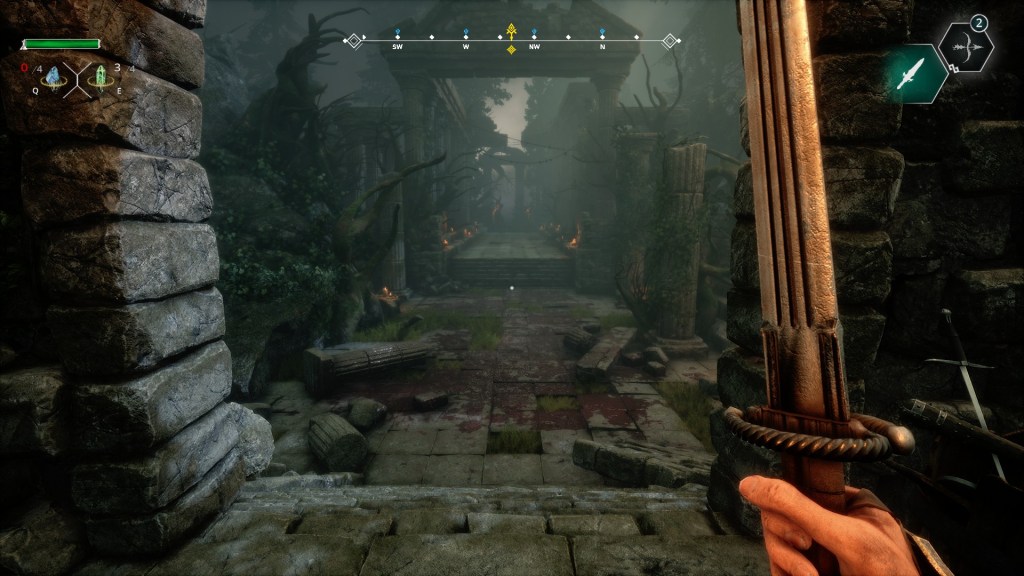
Darkness Over Light
Aside from everything else, Testament is simply criminally boring. It’s a “metroidvania” with few branching paths and too many dead spots where nothing is happening, which are made all the more obvious with the hero speaking to the player at seemingly random moments to explain the state of the world. Even if I look past the game’s numerous flaws, there’s just no excitement. Nothing to really look forward to beyond the okay-but-not-amazing combat. The lack of an understandable story also just prevents any investment I might have in reaching the next part of the game. I guess Testament is relatively bug-free, but that doesn’t mean much if it isn’t fun.
Some of you may think I’m being too harsh comparing a game from an unknown, independent studio bringing their first project to release. Make no mistake, I can see the effort that went into this game and I realize you can’t expect quite as much from an indie studio as you could from big name games with multi-million dollar budgets. But you can still make a good game without infinite resources…I unfortunately just don’t think that happened here. If you want me to lower the bar, Dolmen, a game I reviewed a while back and also made by an indie studio, has significant flaws as well but it’s better than this. I was not expecting this to outdo big AAA games, and I was still let down.
Every minute I played this game was just a reminder that I still need to play through the updated classic, Metroid Prime Remastered (I’ve just been too busy!). While I simply can’t recommend this game even to the most forgiving fans of the genre it so badly wants to be a part of, if you want to put “metroidvania” and “first-person” together, there really is nothing better than the Metroid Prime series. Go play those instead of this.
~ Final Score: 4/10 ~
Review copy provided by Fairyship Games for PC. Screenshots taken by reviewer. Featured image courtasy of Fairyship Games.

You must be logged in to post a comment.